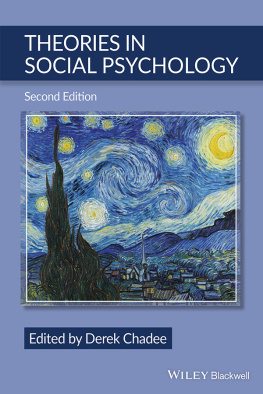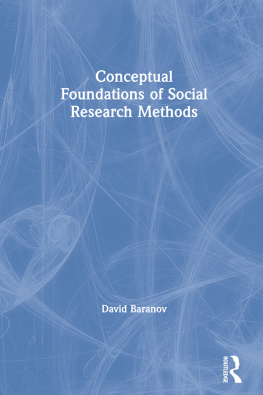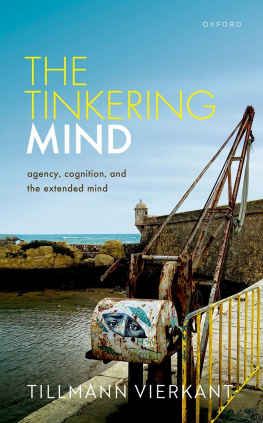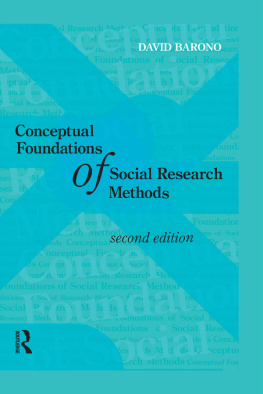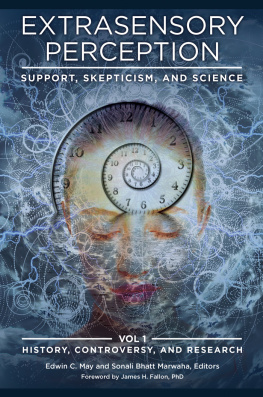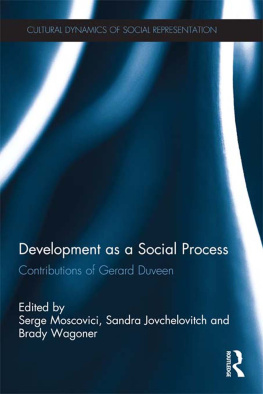Cognitive Consistency:
A Fundamental Principle in Social Cognition
Bertram Gawronski and Fritz Strack, Editors
Handbook of Implicit Social Cognition:
Measurement, Theory, and Applications
Bertram Gawronski and B. Keith Payne,
Editors
Social Cognition: The Official Journal
of the International Social Cognition Network
Jeffrey W. Sherman, Editor
Dual-Process
Theories of the
Social Mind

EDITED BY
JEFFREY W. SHERMAN
BERTRAM GAWRONSKI
YAACOV TROPE

THE GUILFORD PRESS
New York London
Epub Edition ISBN: 9781462514441; Kindle Edition ISBN: 9781462514458
2014 The Guilford Press
A Division of Guilford Publications, Inc.
72 Spring Street, New York, NY 10012
www.guilford.com
All rights reserved
No part of this book may be reproduced, translated, stored in a retrieval system, or transmitted, in any form or by any means, electronic, mechanical, photocopying, microfilming, recording, or otherwise, without written permission from the publisher.
Last digit is print number: 9 8 7 6 5 4 3 2 1
Library of Congress Cataloging-in-Publication Data is available from the publisher.
ISBN 978-1-4625-1439-7
Jeffrey W. Sherman, PhD, is Professor of Psychology at the University of California, Davis. His research investigates the cognitive processes underlying social psychology and behavior, with particular interests in attitude formation and change and how stereotypes and prejudice affect social perception. Dr. Sherman is Editor of the journal Social Cognition. A Fellow of the Association for Psychological Science (APS), the Society for Personality and Social Psychology (SPSP), and the Society for Experimental Social Psychology (SESP), he is a recipient of other honors including the Theoretical Innovation Prize from SPSP and the Anneliese Maier Research Award from the Alexander von Humboldt Foundation and the German Federal Ministry of Education.
Bertram Gawronski, PhD, is Professor of Psychology at the University of Texas at Austin. His research investigates the mental underpinnings and behavioral consequences of spontaneous and deliberate evaluations of objects, individuals, groups, and social issues. Dr. Gawronskis work has been recognized with honors including the Theoretical Innovation Prize from SPSP, the Career Trajectory Award from SESP, the Early Career Award from the International Social Cognition Network, the Early Researcher Award from the Ministry of Research and Innovation of Ontario, and the Charlotte and Karl Bhler Award from the German Psychological Society. He is a fellow of APS, SESP, and SPSP.
Yaacov Trope, PhD, is Professor of Psychology at New York University. His research investigates the interrelations among cognition, motivation, and self-regulation in the social context. Particular interests include how psychological distance influences the representations of objects, and, thereby, the predictions, evaluations, and choices individuals make regarding those objects; self-control processes; and the role of affective states and personal desires in social judgment and decision making. Dr. Trope is a Fellow of the American Association for the Advancement of Science, APS, SESP, and SPSP. His research has been funded by the National Institutes of Health and the National Science Foundation.
Henk Aarts, PhD, Department of Social and Organizational Psychology, Utrecht University, Utrecht, The Netherlands
Nalini Ambady (deceased), PhD, Department of Psychology, Stanford University, Stanford, California
Elinor Amit, PhD, Department of Psychology, Harvard University, Cambridge, Massachusetts
David M. Amodio, PhD, Department of Psychology, New York University, New York, New York
John A. Bargh, PhD, Department of Psychology, Yale University, New Haven, Connecticut
Roy F. Baumeister, PhD, Department of Psychology, Florida State University, Tallahassee, Florida
Galen V. Bodenhausen, PhD, Department of Psychology, Northwestern University, Evanston, Illinois
Maarten W. Bos, PhD, Negotiation, Organizations and Markets, Harvard Business School, Boston, Massachusetts
Pablo Briol, PhD, Faculty of Psychology, Autonomous University of Madrid, Madrid, Spain
Jimmy Calanchini, BA, Department of Psychology, University of California, Davis, Davis, California
C. Daryl Cameron, PhD, Department of Psychology, University of Iowa, Iowa City, Iowa
William A. Cunningham, PhD, Department of Psychology, The Ohio State University, Columbus, Ohio
Ruud Custers, PhD, Department of Cognitive, Perceptual, and Brain Sciences, University College London, London, United Kingdom
Jan De Houwer, PhD, Department of Psychology, University of Ghent, Ghent, Belgium
Roland Deutsch, PhD, Institute of Psychology, Technical University of Dresden, Dresden, Germany
Patricia G. Devine, PhD, Department of Psychology, University of WisconsinMadison, Madison, Wisconsin
Ap Dijksterhuis, PhD, Behavioral Science Institute, Radboud University, Nijmegen, The Netherlands
Ana Rita Farias, PhD, Lisbon University Institute, Lisbon, Portugal, and Utrecht University, Utrecht, The Netherlands
Russell H. Fazio, PhD, Department of Psychology, The Ohio State University, Columbus, Ohio
Melissa J. Ferguson, PhD, Department of Psychology, Cornell University, Ithaca, New York
Klaus Fiedler, PhD, Department of Psychology, University of Heidelberg, Heidelberg, Germany
Ayelet Fishbach, PhD, Booth School of Business, University of Chicago, Chicago, Illinois
Patrick S. Forscher, BA, Department of Psychology, University of WisconsinMadison, Madison, Wisconsin
Jens Frster, PhD, Department of Social Psychology, University of Amsterdam, Amsterdam, The Netherlands
Jonathan B. Freeman, PhD, Department of Psychological and Brain Sciences, Dartmouth College, Hanover, New Hampshire
Kentaro Fujita, PhD, Department of Psychology, The Ohio State University, Columbus, Ohio
Margarida V. Garrido, PhD, Department of Social and Organizational Psychology, University Institute of Lisbon, Lisbon, Portugal
Bertram Gawronski, PhD, Department of Psychology, University of Texas at Austin, Austin, Texas
Sara Gottlieb, BA, Department of Psychology, University of California, Berkeley, Berkeley, California
Joshua D. Greene, PhD, Department of Psychology, Harvard University, Cambridge, Massachusetts
Rainer Greifeneder, PhD, Department of Psychology, University of Basel, Basel, Switzerland
James J. Gross, PhD, Department of Psychology, Stanford University, Stanford, California
Ran R. Hassin, PhD, Psychology Department, The Hebrew University, Jerusalem, Israel
E. Tory Higgins, PhD, Department of Psychology, Columbia University, New York, New York
Mandy Htter, PhD, Department of Psychology, University of Heidelberg, Heidelberg, Germany
Karl Christoph Klauer, PhD, Institute for Psychology, University of Freiburg, Freiburg, Germany
Kristen M. Klein, PhD, Analytic Services, Inc., Falls Church, Virginia
Stanley B. Klein, PhD, Department of Psychology, University of California, Santa Barbara, Santa Barbara, California
Regina Krieglmeyer, PhD, Department of Psychology, University of Wrzburg, Wrzburg, Germany
Arie W. Kruglanski, PhD, Department of Psychology, University of Maryland, College Park, College Park, Maryland
Next page

